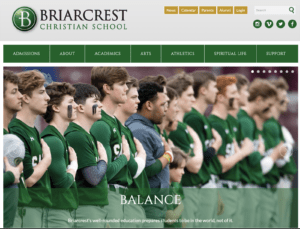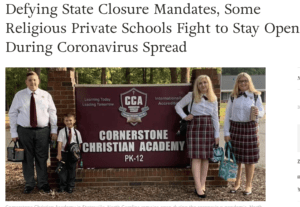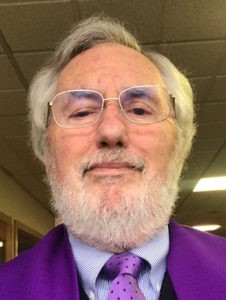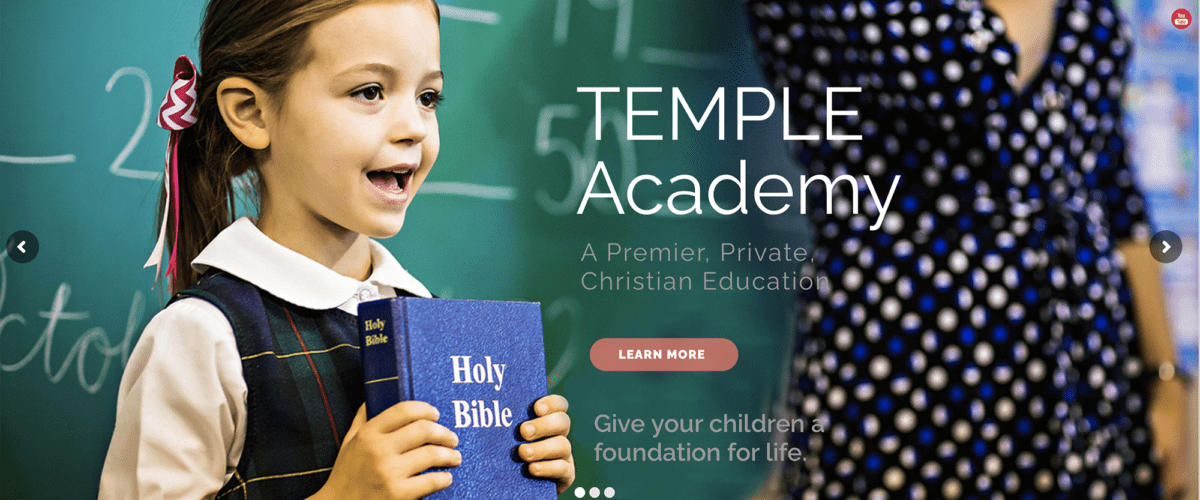The New York Times headline, “Christian Schools Boom in a Revolt Against Curriculum and Pandemic Rules,” begs the question “Why?”
“Why are Christian schools growing? Before addressing this thematic question, there is a definitional concern that needs attention. The secular media, from confusion or ignorance, uses “Christian” to refer to evangelical private schools. Catholic, Episcopal and Lutheran schools are not included in this survey. These religious schools are less likely to be part of the cultural war than evangelical ones. Parochial school systems, like the Catholic and Episcopal schools, are church-related and rely on church resources and clergy, whereas evangelical schools are parent-controlled.
Evangelical parents use “family values” in their ruling of evangelical schools.[1] Seminary professor Steve Harmon, reflecting on the idea that parents should determine curriculum, says, “In the 11 years my son has been a public-school student, I’ve never suggested to his teachers what I thought he should be taught — and I’m a Ph.D. with two and a half decades of experience as a professor. I’m not professionally trained to do what they do, and neither are most other parents.”
Masks, mandates and Critical Race Theory
Why, then, are private evangelical schools growing during the pandemic? On the surface, the enrollment surge can be explained by politics du jour in the age of Trump: masks, mandates and Critical Race Theory. Beneath the surface, in a deeper dive, there are more insidious causes that relate to the persuasive appeals of evangelical schools.
“Beneath the surface, in a deeper dive, there are more insidious causes that relate to the persuasive appeals of evangelical schools.”
One evangelical leader says that this is “the second Great Awakening” for evangelical schools as he compares this growth to the spiritual revivals in early American history — the First Great Awakening with Jonathan Edwards and the Second Great Awakening with the evangelist Charles Finney. This spiritualizes a movement that may also be described as “next-generation segregation.”
Popular opinion suggests that evangelical Christians are leaving public schools out of frustration over masks, mandates and vaccines. These anti-science attitudes, deeply connected to a century of evangelical opposition to science (evolution), are indeed factors but may not be the root cause. Most evangelical parents committed to an anti-evolution stance left the public schools more than two decades ago. Frustrations over losing every court case that attempted to have intelligent design added to the science curriculum fueled this withdrawal from public schools.
 The new wave of curriculum rebels concentrates on American history as the new enemy. Racial identity, segregation and ideology may be stronger drivers of parental opinion. Parents talk about “safety” and “good education for my children.” These are racist tropes in disguise.
The new wave of curriculum rebels concentrates on American history as the new enemy. Racial identity, segregation and ideology may be stronger drivers of parental opinion. Parents talk about “safety” and “good education for my children.” These are racist tropes in disguise.
Deeply submerged in the waters of evangelical life the leviathan remains a problem of race — a theological problem even more than a political or cultural one.
Three primary tropes
The growth in evangelical schools turns out to be more about race than masks and mandates. This may be understood by reviewing the primary tropes of the evangelical rhetorical enterprise: The righteous people, the powerful enemy, the corrupt system. These also are three of the primary tropes of American populism, and thus the evangelical movement away from public schools is at heart a form of religious populism. It pretends not to be about race, but at heart evangelicals have a race problem.
Evangelicals have fully participated in a constructed fantasy that prevailing definitions of the real and the “truth” are actually fake and fictional. Their rejection of science and history has led them to a wholesale attack on Critical Race Theory — and this, of course, is about race.
Evangelicals never develop racist philosophy so much as they insinuate it, a rhetorical hit-and-run exercise. They articulate their racism with what Edwin Black terms “stylistic tokens.” These tokens act as cues for auditors, “cues that tell them how they are to view the world, even beyond the expressed concerns, the overt propositional sense, of the discourse.”
“Evangelicals never develop racist philosophy so much as they insinuate it, a rhetorical hit-and-run exercise.”
The rhetorical nature of this game of illusion consists of words used and words avoided. There are “scare words” like “cultural competency,” “inclusion,” and “diversity.”
Today, some schools — generally newer and smaller — advertise themselves directly as standing athwart history. “Critical Race Theory will not be included in our curriculum or teaching,” promises a new school opened by a large church in Lawrence, Kan. “The idea of gender fluidity has no place in our churches, schools or homes,” the headmaster of another new school in Maricopa, Ariz., writes on his school’s website.
But most schools do not make such overt references. “They use words like ‘alternative’ or ‘Christian’ or ‘traditional,’” said Adam Laats, a historian at Binghamton University.
This leads to a perniciously perverse rhetoric that constructs lies of a “perfect America” in order to avoid the historical truth of our history.
 Yet this world of the fantastic, created by evangelicals, is hollow at its core. Unlike marvelous secondary worlds, which construct alternative realities, the shady worlds of the fantastic construct nothing. They are empty, emptying, dissolving.
Yet this world of the fantastic, created by evangelicals, is hollow at its core. Unlike marvelous secondary worlds, which construct alternative realities, the shady worlds of the fantastic construct nothing. They are empty, emptying, dissolving.
There is no salvation in this retreat into the deep woods of the alternate universe of white evangelicals, only the articulation of anxiety, fear and shame. There is no revisionist history capable of whitewashing America’s “flaws.” There is no escaping the “bloody heirloom” of slavery, segregation and shame. The genre of the fantastic provides the sound and fury of evangelical angst while, in fact, signifying nothing. The retreat of evangelicals into an alternate universe seems as tragic as that of the ragtag Confederate armies slipping back South — barefoot, bedraggled, hungry, desperate, riddled with melancholy.
So it is that masks and mandates offer new rhetorical tropes for leaving public schools but may only mask the standard reason: When racial identity, white privilege and reality encroach on the alternate truth universe of evangelicals, they always flee to a deeper refuge.
Understanding this rhetorical move requires a review of the dominant tropes of evangelicals as religious populists: the righteous people, the enemy, and the system.[2]
The people
The “people” are rendered as ordinary, simple, honest, hard-working, God-fearing, patriotic Americans. They are the defenders of traditional values: The Bible, faith, America. The people are omnipotent, and evangelicals mobilize around being God’s “all right, all the time” holy people.
They have mobilized through a shared sense of aggrievement, anger, resentment, fear and shame. They believe they are the foundational cornerstones of our nation. This forms the “people’s” persona.
Thus, “evangelical people” have mobilized to defeat all the enemies of God. Their identity, however, depends upon having enemies. This is a symbiotic process: No enemy, no people.
“Their identity, however, depends upon having enemies. This is a symbiotic process: No enemy, no people.”
Evangelicals are defined by what they oppose: “the conviction that a (liberal) elite has dishonored a historically, culturally or spiritually constituted people, its memories, origins, common territory, ways of life.”[3]
This identity can’t be seen as diverse, as one of other possibilities; it can only exist in certainty, in nonnegotiable terms with a well-defined heinous and dangerous, almost invulnerable enemy that threatens both the people and the nation.
The specific enemy
The creation of enemies consumes much evangelical work. There’s a “National Build-an-Enemy Factory” hidden somewhere in the alternate universe of evangelicals. These enemies roll off the assembly line as needed. The specific enemy in relation to evangelical schools is Critical Race Theory.
All the words — critical, race, theory — are problematic for evangelicals. For more than a century they have attacked “critical” as in critical study of the Bible, critical thinking and what they consider to be an attack on the Bible and on our godly nation. “Theory” always has disturbed evangelical imaginations until they attempted to flip the meaning of the word “theory” and claim that evolution was only a “theory.”

Website of a private Christian school in Southern California.
Of the three words, however, the word that carries the most weight is “race.” Always it is about race. When someone says, “This is not about race” they might as well be saying, “It’s not about the money.”
Critical Race Theory has become a more content-specific “devil” term than its immediate and lingering cousin, “political correctness.” Donald Trump managed to turn “political correctness” into an evil enemy that was shaming and destroying the dignity of evangelicals. Critical Race Theory takes this understanding a step further and is demonized as a method of teaching that belittles evangelicals.
Evangelicals, as part of a religious populism, have created an enemy, a powerful, hard-to-define, yet pernicious enemy in Critical Race Theory. They present themselves as a proud and righteous people attempting to save their children from the ravages of a liberal culture that is Marxist, socialist, pagan, ungodly.
The system
The “enemy” and “people” combination are two of the primary tropes of American populism. A closely related trope is that the “people” see the “enemy” as the primary ally of the “system.” In evangelical language the “system” has to do with government control, especially with the government telling parents what to do.
The “system” is an amalgamation of numerous sites within the national political and economic order in which power is distributed, governed and managed. As defined by populists, the “system” once represented the founders’ conception of pure justice.
For evangelicals, a previously perfect system was developed in the Bible. Now, evangelicals oppose the “system,” because it has been corrupted. This has been a carefully constructed product of mistrust of the system, the feeling that the anchor institutions of democracy are not working to the advantage of evangelicals.
“Evangelicals pitch themselves as an underdog ‘people’ pitted against an elite ‘enemy.'”
Evangelicals pitch themselves as an underdog “people” pitted against an elite “enemy.” The conflict between the “people” and the enemy initiates the populist crisis; the corrupted system accelerates it. Good is losing the battle to evil. Worse still, the structures designed to uphold justice have become too remote, corrupt or beholden to “special interests” to yield redress. Evangelicals have a long-simmering beef with the system — government control.
Evangelicals are always suspicious of “government control” except for abortion and Trump’s border wall. They don’t want the government telling them what to do, but they want to control the government and then tell the people what to do. In addition, they stand in line with everyone else to receive public funding and aid.
They appropriate government funding, not just to defend their own organizations and ministries, but to make the conditions accessible for wresting back control from the elites’ management of these institutions.
According to the evangelical and populist mindset, liberals have captured the “public spaces” in culture — media, schools, universities, the government, the notions of truth. And now the “people” must reclaim that space. America’s godly heritage must be restored.
Retreat to indoctrination
One way of reclaiming the system is by retreating to evangelical schools where children can be indoctrinated into revised visions of American history.
“One way of reclaiming the system is by retreating to evangelical schools where children can be indoctrinated into revised visions of American history.”
American historian William V. Trollinger wrote an article that shines a bright light on the racism of Sen. Tom Cotton of Arkansas. Cotton has complained about “revisionist charlatans of the radical left (who) have lately claimed the previous year (1619) as America’s true founding.”
The ironically named senator from Arkansas wants to educate Americans about slavery and its legacy — that slavery was a “necessary evil” that allowed America to be the great nation it is today.[4] Cotton turns out to represent what historian Robert McElvaine terms “antisocial Darwinism.” As long as white people are allowed to “feel good,” the brutal realities of our cruelty to slaves can be justified.
Thus, evangelical schools offer parents a deal. If they will enroll their children in evangelical schools, they will enjoy the full benefits of not being made to feel bad about America’s history. They will not have to face any of the crimes against African Americans and Native Americans.
This does not protect evangelical parents from the burgeoning pedagogy of shame developed by secular civil virtue. Even more tragic, this deal eliminates the possibility of evangelical students experiencing the truth of America’s “flaws” so that they might have an actual evangelical experience of repentance. Instead, the evangelical emotion machine delivers a Edenic America of feeling good and feeling free.
‘But I’m not a racist’
Assessing racism as a root cause for evangelical school growth produces howls of protest and denial from evangelicals. Conservatives reject comparisons between their opposition to Critical Race Theory and the desegregation backlash of the last century.
“I don’t know a single school that even comes close to promoting that kind of concept,” said Jeff Keaton, who promotes “Christian worldview training” for students. “What they don’t like is critical theory, where they pit kids against each other in oppressed and oppressor groups.”
Evangelicals point out that only 68% of their private school students are white and that no evangelical school is racist. Evangelicals also point out that their schools have been in operation long before the school desegregation decision Brown v. Board of Education in 1954. This is, of course, a valid point, but between 1971 and 1981 the number of conservative Christian schools grew from 140,000 to 450,000. The primary motivation here was segregation.
“Denial of racism is not proof that racism is not the primary factor.”
Denial of racism is not proof that racism is not the primary factor. Fifty years after the Civil Rights Movement, racist philosophy has become more subtle. The white sheets of the KKK have been discarded for the white cloak of invisibility, which not only hides the reality of racism from evangelicals but attempts to hide racism from the entire culture. Evangelical leaders are not overt racists.
While there may be a sense of cognitive dissonance involved, I believe a person can be convinced that she is not a racist in individual terms but still can be part of the systemic racism of our culture. That leads to the white cloak of invisibility that is constructed as a rhetorical trope.
The cloak of invisibility

Daniel Radcliffe as Harry Potter in the Warner Bros. movie adaptation.
Evangelicals hide behind claims such as, “There is no systemic racism in America,” or “Everyone who knows me knows that I’m not a racist.” Evangelicals have borrowed Harry Potter’s “invisibility cloak” and thrown it over the nation. The fabric of the invisibility cloak is “deny, deny, deny.”
Evidence that shows evangelical schools have minority students is used to deny racism. Evangelical support of minority causes is presented as evidence. Like a whiteout in Pierre, S.D., or a fog-covered bayou in Louisiana, there is whiteness and nothing but whiteness. Part of our task, theologically and rhetorically, is coming to terms with our racism and grappling with the existence of the white cloak of invisibility.
While the “sun has set on the era of white Christian dominance,” as Robert P. Jones argues, in The End of White Christian America, the invisibility cloak hides even this slide into decline. The danger of living in such whiteness, another word for blindness, is that, as Slavoj Žižek puts it, “Now is the time for monsters.”[5]
Imani Perry notes that racism percolates through us, often outside our field of awareness. In the twilight of overt racism, the cloak of invisibility — “an apparatus of instrumentalized racialization” — is used to elevate whites by enveloping others in shame.[6]
White supremacy, long associated with the KKK, white hoods and robes, burning crosses and lynch mobs, seems too grotesque to be admitted, and so evangelicals put white supremacy in this “frozen-in-time” past that doesn’t include their whiteness. This is a benefit of the cloak of invisibility.
Zeus Leonardo explains that racially coded language appears neutral yet demonstrates “whites know how to talk about race without having to mention the word.”[7] Such an ability to talk about race or racism without being explicit is a form of white racial knowledge, “comprised of a constellation of metaphors used to define whites’ sense of self and group in oppositions to a denigrated other.”
Another way this works out in experience is that many white people view an impoverished white person as down on their luck but view an impoverished person of color as lazy. These kinds of racist tropes prevail across the spectrum. Ta Nehisi Coates argues: “The tightly intertwined stories of the white working class and Black Americans go back to the prehistory of the United States — and the use of one as a cudgel to silence the claims of the other goes back nearly as far.”
It is impossible, under these ancient understandings, to imagine evangelical schools without the force of whiteness.
Pulling back the cloak
In spite of the white cloak of invisibility, evangelical schools are just one more cultural war battlefield over race. Coates asserts, “To accept that the bloody heirloom remains potent even now, some five decades after Martin Luther King Jr. was gunned down on a Memphis balcony — even after a Black president; indeed, strengthened by the fact of that Black president — is to accept that racism remains, as it has since 1776, at the heart of this country’s political life.”
Eddie Glaude Jr. attempts to pull back the cloak of invisibility: “The phrase ‘white supremacy’ conjures images of bad men in hooded robes who believed in white power … but that’s not quite what I mean here. On a broader level, white supremacy involves the way a society organizes itself, and what and whom it chooses to value. … A set of practices informed by the fundamental belief that white people are valued more than others.”[8]
Fear, shame, resentment and anger all morph into one emotionally powerful machine of rhetorical creation.
“Evangelical leaders complain that their children are being made ‘to feel bad’ by teaching about slavery and segregation.”
Evangelical leaders complain that their children are being made “to feel bad” by teaching about slavery and segregation. At a time when evangelical shame was boiling over from the pedagogy of shame, evangelical schools have exploited that to enroll more evangelical students.
Schaefer argues, “Progressive politics, in particular — the politics of antiracism, gender emancipation, queer emancipation, and of new horizons of political enfranchisement — is organized around a retraining and a reteaching of bodies.” This results in a sense of shame evangelicals are determined to avoid.
“Shame saturates contemporary politics. Bodies that once felt like the unchallenged masters of their space — white bodies, male bodies, cis bodies, straight bodies, rich bodies, citizen bodies — are being confronted, more and more, with a demand to respond to the violence trailing in the wake of the comforts and pleasures they enjoy.”
Protecting children
In evangelical school settings, students are free to ignore our racist history, and this retreat is not a mere defensive move, but more of a perverted ressourcement: a return to the sources to regroup, rearm and attack once again in the effort to control the institutions of government.
The conflict between the “people” and the enemy initiates the populist crisis; the corrupted system accelerates it. Good is losing the battle to evil. Worse still, the structures designed to uphold justice have become too remote, corrupt or beholden to “special interests” to yield redress. The system has been contaminated by court-packing schemes, gerrymandering, ballot stuffing, bribery, moral decay and political chicanery.
Because the system has degenerated, other more radical means are necessary to prevent the enemy’s impending victory. In the cultural war that has long included evangelical schools, the “people” are considered the best sources for what their children need educationally, and the “experts/elitists” are the scholars and historians who are forcing Critical Race Theory on students.
In evangelical views, historians “appeared to disdain the founding fathers, question the intentions of presidents, and cast doubt on the integrity of all dead white males. Millions of evangelicals began asking what had happened to their country. The decadence and secularism of the modern age pointed to satanic conspiracies and even the coming of the apocalypse. Conservative evangelicals looked to their leaders for wisdom in understanding how their world had spun out of control.”[9]
These leaders are considered “anointed” by God, and this is far more important among evangelicals than academic credentials.
The truth and the response
There is truth in the charge that children will encounter values — secular, progressive Christian values, that are the opposite of conservative values. That doesn’t make them wrong. There is a pedagogy that shames conservative values of racism and nativism. The pedagogy of shame is a major player in this unfolding contest.
The secular civic virtue that led to civil rights, gay marriage and women’s rights contains a pedagogy of shame. Evangelicals, long the primary “shamers” of an immoral age, have been shamed by their racism, nativism and homophobia. The shamers don’t like being shamed, and they are responding with an all-out attack on Critical Race Theory.
That creates a specific crisis that necessitates the “people’s” action, which results in growing enrollments in private Christian schools.

Rodney Kennedy
Rodney W. Kennedy currently serves as interim pastor of Emmanuel Freiden Federated Church in Schenectady, N.Y., and as preaching instructor Palmer Theological Seminary. He is the author of nine books, including the newly released The Immaculate Mistake, about how evangelical Christians gave birth to Donald Trump.
Related articles:
Racism and the evolution of Protestant support for private education | Analysis by Andrew Gardner
Biden administration signals intent to defend religious exemption for schools
Notes:
[1] See Seth Dowland, Family Values and the Rise of the Christian Right, chapter 1.
[2] Michael J. Lee The Populist Chameleon: The People’s Party, Huey Long, George Wallace, and the Populist Argumentative Frame,” Quarterly Journal of Speech Volume 92, 2006 – Issue 4, 355-378
[3] Harry Boyte, “The Making of a Democratic Populist: A Profile,” in The New Populism: The Politics of Empowerment, ed. H. Boyte and F. Riessman (Philadelphia: Temple University Press, 1986
[4] William V. Trollinger, “Tom Cotton’s Thanksgiving, or, My Second-Grade Textbook Told the Truth and I Don’t Want Actual History to Get in the Way of My Feeling Good About Myself as a White Male”
[5] Žižek, “A Permanent Economic Emergency,” New Left Review, 2010.
[6] Perry, More Beautiful and More Terrible, 42.
[7] Leonardo, Race, Whiteness, and Education, 114.
[8] Glaude, Jr., Democracy in Black, 6. Glaude refers to “the thick fog of uncertainty.”
[9] Randall J. Stephens and Karl W. Giberson, The Anointed


